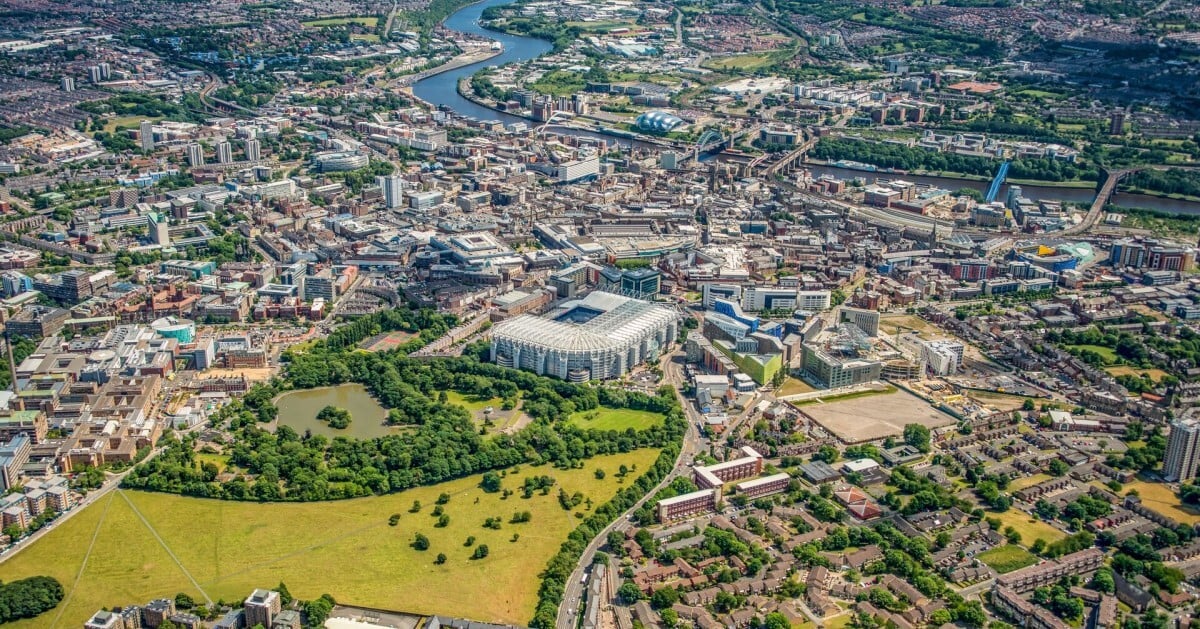Shaping the future: Newcastle and the 4th Generation University
12 August 2025 | By: Professor Jane Robinson, Pro-Vice-Chancellor for Engagement and Place | 5 min read
In recent years, a new idea has been gaining momentum across the higher education sector – one that reshapes the very reason universities exist.
Here, Professor Jane Robinson, Pro-Vice-Chancellor for Engagement and Place at Newcastle University, talks about the 4th generation university, and our role shaping the idea.
Contents:
- What is a 4th generation university?
- Why now?
- 4GU in action: what it looks like at Newcastle
- Shaping the future: what’s next?
- Rooted in our DNA, focused on the future
What is a 4th generation university?
While the phrase 4th generation university (4GU) might sound like the next iteration in a tech evolution, it’s really about how universities respond – boldly, collaboratively, and meaningfully – to the increasingly complex challenges we face in society, today and beyond.
But here at Newcastle University, it’s not a trend or a new initiative. It’s an idea that’s deeply connected to our history, how we work already, and our plans for the role we will play for communities worldwide in the future.
The truth is that universities have always evolved. This is – after all – the 4th generation.
Each generation has been a response to what was needed in society at the time. 1st generation universities were focused on teaching, 2nd generation on research, and the 3rd generation concentrated on innovation and knowledge exchange.
And now, 4th generation universities bring all of these iterations together into one cohesive vision that works with communities to bring about real change in the world. These institutions work to uplift people, nurture talent, and develop local ecosystems to benefit everyone, and create a better future. Think of 4th generation universities as catalysts, not only shaping solutions, but working with our partners to deliver real change.
This isn’t just about bolting on engagement to our existing work. It’s more than that. It’s genuine co-creation. And rather than knowledge transferring back and forward over our walls, we are bringing the walls down to create equal and trusting partnerships.

The 4th generation university quadruple helix model
This idea draws on the 'quadruple helix' model – collaboration across four key sectors: universities, industry, government, and civil society. And it’s at the point where these areas intersect that 4th generation universities exist. Where everything they do brings together all disciplines, skills, areas of expertise, and professional services to tackle big problems that impact society.
At Newcastle, this principle is more than theoretical. We’re a founding member of a group of global universities that are working on what it really means to be a 4th generation university, and planning practical steps for other institutions to move into this new generation beside us.
Why now?
The need for this evolution couldn’t be more urgent.
Globally, we’re facing escalating challenges – climate change, public health pressures, strained economies, and social inequalities. And locally, regions like ours in the North East of England are dealing with the long-term effects of industrial change, poor health outcomes, and persistent inequalities.
The 4th generation university model is a direct response to this rapidly-changing and complex world. It is both the engine powering societal impact, but also a gateway for the empowerment of communities. Being relevant and adding value to local communities is absolutely central.
At the same time, the expectations on universities have never been greater. Governments want us to deliver economic growth, widen participation, increase efficiency, and support the levelling up of society. In the UK, the Government’s Modern Industrial Strategy is pushing for growth across the country. Globally, institutions like ours are being asked to prove our value to real people, in real places. Young people and students also need to be equipped with the skills and knowledge to grapple with a fast-changing world and an uncertain future.
This is not new territory for Newcastle. We’ve always been a civic university, founded by engineers, medics, and innovators who wanted to solve the real-world problems of their time. But now, the 4th generation idea also extends to innovations in arts and humanities, social justice, and sustainability, too. That legacy runs through everything we do, from community projects which open the doors to young people from underrepresented communities, to celebrating inclusivity on campus with our annual Discover Festival.
4th generation universities in action: what it looks like at Newcastle
You can already see the 4th generation model at work in projects across our University.
Our annual Discover Festival brings down our campus walls and invites everyone – from toddlers to older people – to step inside our laboratories, meet technical staff, and be part of the work we do. The festival is a fabulous demonstration of the ‘porosity’ of the boundary between Newcastle University and our community. With such varied on-campus facilities, museums, galleries, theatres, gardens, sport and more – there are countless bridges for people of all interests and backgrounds to come, meet us, and work with us.

Discover Festival 2025 at Newcastle University
But there are also so many active demonstrations of our partnership work too.
For example, working with industry, local authorities and the North East Combined Authority, to develop Energy Central Campus in Blyth. This town, once defined by heavy industry, is now a hub of green innovation. We’re working with local schools, employers, and communities to create pathways into the green economy — from school-age children to adults retraining for new careers. It’s a tangible example of how we translate our research, skills, and values into opportunity for the region.
Or consider Made in the North East, our partnership with Nissan and others to support advanced manufacturing, skills development, and inclusive economic growth.
Or our role as a founding member and strategic partner of Tyne & Wear Citizens, the local chapter of Citizens UK. Here, community organisers work directly with our staff and students to understand the issues that matter to people – from housing to mental health to employment – and shape collaborative responses. Our Into University partnership in the East End of Newcastle has also seen progression rates in the area to higher education rise from a local 12% to 74%, compared with national average progression rates for students from local authority-maintained schools of 44%. These results perfectly demonstrate that talent is everywhere, but opportunity isn’t. That’s not just a statistic – it’s real lives changed.
All of this, and more, reflects a ‘4GU way of working’ – open, embedded, and woven into the fabric of our place.
Our world-leading research in rare diseases is making a huge difference to the lives of individuals, families, and communities. A recent example is our pioneering licensed IVF technique developed in partnership with the NHS, designed to reduce the risk of mitochondrial diseases in babies. This work is a huge step towards a future where we could break the cycle of this hereditary genetic disease and give children a healthy start in life.
Shaping the future: what’s next?
While co-creating with communities isn’t new to us, the road ahead still requires focus, honesty, and intention.
Our next step is engagement – meaningful conversations with staff, students, partners, and communities about what being a 4GU really means for Newcastle. What should we prioritise? How can we be ambitious while being realistic about our resources? This autumn, we’ll be working collaboratively to shape our vision and practical next steps.
We know this will require changes — in systems, in ways of working, and in how we support staff. Interdisciplinary work across fields, disciplines, and expertise, for example, is vital. Complex problems can’t be solved with a single-minded view, so our responses to the world’s problems can’t either. That means building confidence and skills not just among academics, but across professional services and support teams, too.
We’re also looking at how we measure impact. What does success look like for a 4GU? We’re drawing on national and international networks to help shape shared frameworks for reporting and learning. The Research Excellence Framework, Teaching Excellence Framework, and Knowledge Exchange Framework are all part of this picture. We want to lead the way nationally and globally.
Rooted in our DNA, focused on the future
Looking ahead to 2034 — our University’s 200th anniversary — we have a powerful opportunity to connect our past to our future.
Being a 4th generation university isn’t about ticking boxes. It’s about leading the next generation of thinking and doing in a way that’s authentic to us. Whether through our work on sustainability, social justice, health, or heritage, we aim to be a global exemplar of how universities can serve society — not despite the challenges we face, but because of them.
We don’t have all the answers. And that’s the point. This is a co-creation process. A puzzle with pieces still to be placed. But we know the direction. We know that universities must act as conveners, collaborators, and change-makers.
That’s what we’ve always done. That’s what we’re doing now. And that’s what we’ll continue to do – together.
You might also like…
- find out more about the author – Professor Jane Robinson, Pro-Vice-Chancellor of Engagement and Place at Newcastle University
- read more about 4th generation universities at HEPI, the UK’s only independent think tank devoted to higher education
- read more of Jane's thoughts about fourth generation universities in her WONKHE thought piece: Collaboration must be at the heart of regional growth
- explore some of our incredible community and research projects, such as:
- Energy Central Campus in Blyth
- Made in the North East, our partnership with Nissan and others
- our role as a founding member and strategic partner of Tyne & Wear Citizens
- our INTOUniversity partnership in the East End of Newcastle, to open doors to higher education in disadvantaged areas
- our pioneering IVF technique, developed to reduce the risk of passing on mitochondrial diseases
